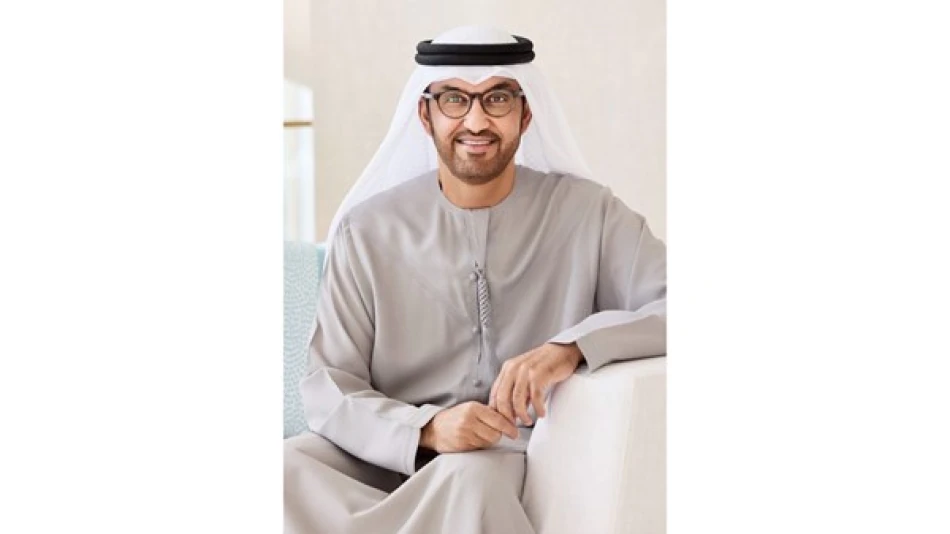
UAE's Sultan Al Jaber Awarded 'Global Leadership Excellence' Prize for 2026 by Middle East Institute
UAE's Energy Chief Wins Global Leadership Award as AI Drives New Power Paradigm
Dr. Sultan Ahmed Al Jaber, the UAE's Minister of Advanced Technology and CEO of ADNOC, has been awarded the Middle East Institute's "Distinguished Global Leadership Award 2026" — recognition that highlights how Middle Eastern energy leaders are reshaping global power dynamics in the age of artificial intelligence. The timing underscores the growing importance of energy-rich nations like the UAE as AI data centers create unprecedented electricity demand worldwide.
Strategic Recognition at a Critical Energy Juncture
The award, to be presented at the Middle East Institute's 78th annual gala in Washington D.C. in March 2026, comes as global energy markets face a fundamental shift. AI's explosive growth is driving power consumption to levels that challenge traditional energy planning, making Al Jaber's pragmatic approach to energy diversification increasingly relevant to international policymakers.
The Institute cited Al Jaber's contributions to implementing the UAE's energy vision, developing advanced technology capabilities, and fostering international cooperation. His work spans from traditional hydrocarbon development to renewable energy expansion — a dual approach that reflects the complex realities of meeting surging global energy demand.
The AI Energy Challenge Creates New Geopolitical Dynamics
Al Jaber's leadership of the ENACT Council, which brings together energy, technology, and investment leaders in both Abu Dhabi and Washington, exemplifies how energy diplomacy is evolving. The initiative focuses specifically on meeting AI's growing energy requirements while leveraging artificial intelligence to transform energy systems themselves.
This positioning mirrors strategies employed by other resource-rich nations seeking to maintain relevance in a rapidly digitalizing global economy. Unlike Norway's sovereign wealth fund approach or Saudi Arabia's NEOM megaproject, the UAE under Al Jaber's influence is betting on becoming an essential bridge between traditional energy supply and next-generation technology infrastructure.
Market Implications for Energy Investors
From an investment perspective, Al Jaber's recognition signals growing institutional confidence in integrated energy strategies that combine hydrocarbon expertise with renewable expansion. His transformation of ADNOC into what the company calls an "advanced international energy company" leveraging AI and advanced technology represents a template that other national oil companies may follow.
The establishment of XRG, ADNOC's international investment energy company specifically designed to meet AI-driven energy demand, suggests that traditional energy giants are positioning themselves as essential infrastructure providers for the digital economy rather than merely commodity suppliers.
COP28 Legacy Shapes Energy Pragmatism
Al Jaber's role as president of COP28, which produced the historic UAE Consensus uniting nearly 200 countries on climate action, demonstrates how energy-producing nations are reframing environmental discussions. Rather than viewing fossil fuels and renewables as mutually exclusive, his approach emphasizes energy source diversification to meet growing global demand while reducing emissions intensity.
This pragmatic methodology — bringing market realities into political climate discussions — contrasts with more ideologically driven approaches seen in European energy policy or California's aggressive renewable mandates. The UAE's strategy appears designed to maintain energy security while gradually transitioning toward lower-carbon alternatives.
Regional Competition and Cooperation
Al Jaber's leadership occurs within a broader regional context where Gulf states compete to become essential energy and technology hubs. While Saudi Arabia focuses on massive transformation projects and Qatar emphasizes LNG leadership, the UAE under Al Jaber's influence is positioning itself as the pragmatic partner for both traditional energy needs and emerging technology requirements.
His oversight of Masdar, one of the world's leading renewable energy companies, alongside his ADNOC responsibilities, creates a unique institutional capability that few other regional leaders can match. This dual expertise becomes increasingly valuable as global energy systems require both immediate supply security and long-term sustainability planning.
Implications for US-Middle East Energy Relations
The Middle East Institute's decision to honor Al Jaber reflects recognition within Washington policy circles that energy partnerships with Gulf states remain strategically important despite America's own energy production growth. As AI development accelerates primarily in the United States and China, ensuring reliable global energy supply chains becomes a national security consideration.
Al Jaber's emphasis on "supportive growth policies that encourage investment" and "practical measures including a diversified energy mix approach" aligns with emerging bipartisan American thinking about energy security in the AI age. This convergence suggests that US-UAE energy cooperation may deepen regardless of broader geopolitical tensions in the region.
The award ceremony in March 2026 will bring together senior US government officials, diplomats, business leaders, and international policy experts — providing Al Jaber with a significant platform to further articulate how energy-producing nations can contribute to global technology advancement while maintaining economic growth and energy security.
Most Viewed News

 Layla Al Mansoori
Layla Al Mansoori






